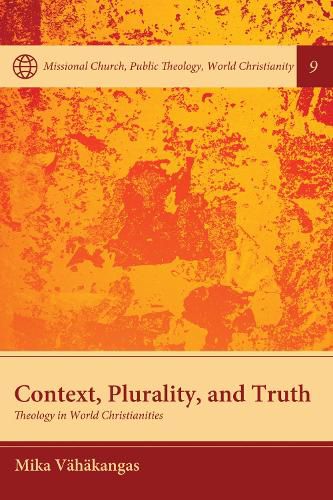Readings Newsletter
Become a Readings Member to make your shopping experience even easier.
Sign in or sign up for free!
You’re not far away from qualifying for FREE standard shipping within Australia
You’ve qualified for FREE standard shipping within Australia
The cart is loading…






This title is printed to order. This book may have been self-published. If so, we cannot guarantee the quality of the content. In the main most books will have gone through the editing process however some may not. We therefore suggest that you be aware of this before ordering this book. If in doubt check either the author or publisher’s details as we are unable to accept any returns unless they are faulty. Please contact us if you have any questions.
The world has shrunk in the processes of globalization, and the old ways of actively ignoring plurality in theology are no longer viable. Contextual differences between different Christian traditions and theologies are highly visible due to improved communications and migration. These differences also witness that this plurality has existed since the very beginning of Christianity. Religious studies demonstrate that no religion is pure and hermetically sealed from others, but they all are syncretistic in the sense of giving and taking. In the world of religions, where boundaries are porous and the internal plurality of Christianity is vast, there is a temptation either to reject the plurality in a fideistic manner or succumb to relativism. The first solution is intellectually hard to defend, and relativism is often seen as detrimental to Christian identity. This book proposes a way of recognizing the contextual and syncretistic dimensions of pluralism while not surrendering to relativism. Christian identity and tradition can be affirmed while staying open to the challenges of pluralism.
$9.00 standard shipping within Australia
FREE standard shipping within Australia for orders over $100.00
Express & International shipping calculated at checkout
This title is printed to order. This book may have been self-published. If so, we cannot guarantee the quality of the content. In the main most books will have gone through the editing process however some may not. We therefore suggest that you be aware of this before ordering this book. If in doubt check either the author or publisher’s details as we are unable to accept any returns unless they are faulty. Please contact us if you have any questions.
The world has shrunk in the processes of globalization, and the old ways of actively ignoring plurality in theology are no longer viable. Contextual differences between different Christian traditions and theologies are highly visible due to improved communications and migration. These differences also witness that this plurality has existed since the very beginning of Christianity. Religious studies demonstrate that no religion is pure and hermetically sealed from others, but they all are syncretistic in the sense of giving and taking. In the world of religions, where boundaries are porous and the internal plurality of Christianity is vast, there is a temptation either to reject the plurality in a fideistic manner or succumb to relativism. The first solution is intellectually hard to defend, and relativism is often seen as detrimental to Christian identity. This book proposes a way of recognizing the contextual and syncretistic dimensions of pluralism while not surrendering to relativism. Christian identity and tradition can be affirmed while staying open to the challenges of pluralism.